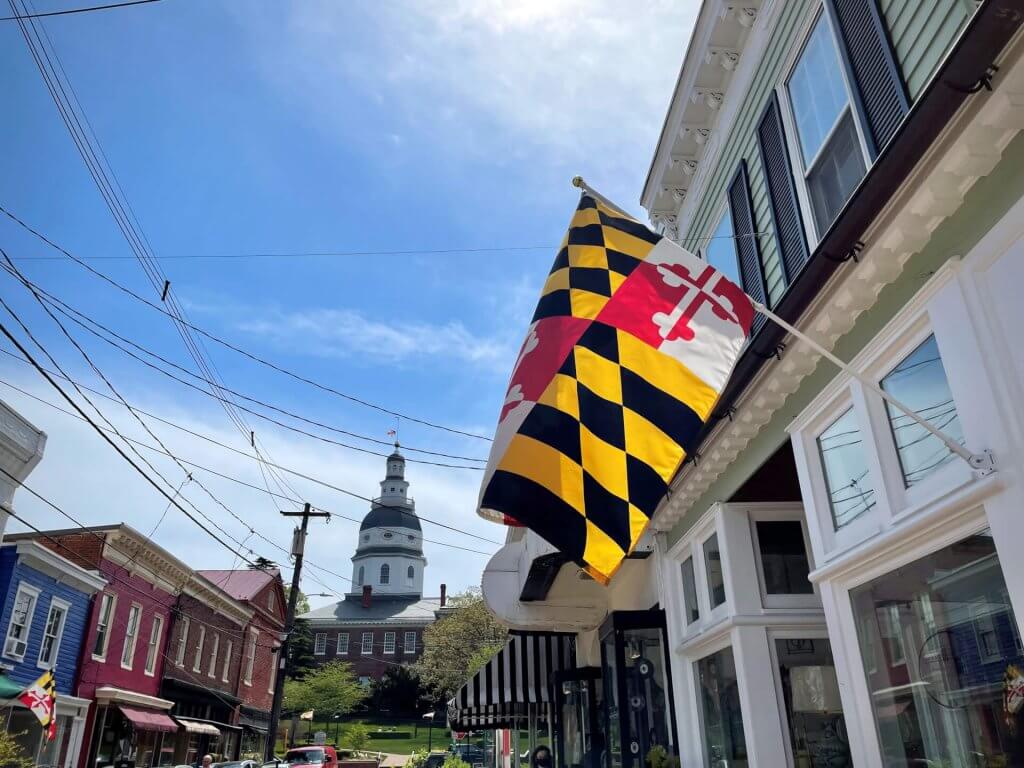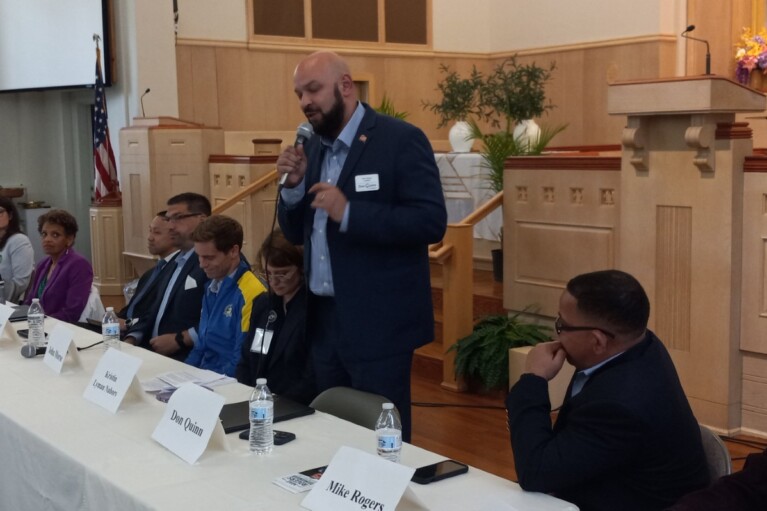Legislative Roundup: Climate Change, Abortion Access and ‘Ghost Gun’ Bills Advance in General Assembly

The Maryland House of Delegates gave preliminary approval to the Climate Solutions Now Act on Monday, with changes that include delaying the date for the state to reach an interim greenhouse gas reduction goal and requiring newly constructed buildings to be ready to get off of fossil fuels.
The Climate Solutions Now Act of 2022, sponsored by Sens. Paul Pinsky (D-Prince George’s), Senate President Bill Ferguson (D-Baltimore City) and 25 additional senators, would expedite the statewide goal to achieve carbon neutral emissions by 2045, primarily through requiring large buildings to reduce their carbon footprint over the next decade.
On Friday, two key House committees voted to approve several changes to the sweeping climate bill, including delaying the date by which an interim greenhouse gas reduction goal — to reduce emissions to 60% of 2006 levels — must be met, from 2030 to 2031. The bill would also now require newly constructed buildings to be prepared to switch to electric power and no longer require the construction of net-zero school buildings by local school districts.
However, the amended bill would give some financial aid to local school districts that decide to build net-zero school buildings. More specifically, certain counties can receive 5% more of the state share for school construction projects if the project is a net-zero school.
The amended Climate Solutions Now Act also removed restaurants and other food service facilities from the list of large buildings that would be required to reduce their greenhouse gas emissions over time. The measure requires commercial buildings or multifamily residential buildings that are 35,000 square feet or larger to reduce emissions by 20% below 2025 levels by 2035 and to achieve net-zero emissions by 2040.
That amendment came after several lawmakers raised concerns about what the bill would mean for the restaurant industry in the Economic Matters Committee on Friday. “These restaurants, almost all of them, I can’t imagine an electric version of a gas cooktop,” said Del. Chris Adams (R-Middle Shore). “There’s always going to be places where natural gas is better than electric.”
During floor debate, Minority Leader Jason Buckel (R-Allegany) asked if the bill would eliminate all use of fossil fuel, petroleum and coal in order for the state to achieve the ambitious greenhouse gas reduction goals. Del. Dana Stein (D-Baltimore County) referred to the Maryland Commission on Climate Change, which recommended that the state should increasingly electrify its economy. “But there was no thought that we were wiping out the use of fossil fuels in our economy,” Stein said.
After the House of Delegates passed the Climate Solutions Now Act on second reading Monday, Pinsky said that although he is “generally pleased” with the amended bill, he was disappointed that delegates removed efforts to reduce emissions from school buildings.
The amended bill also now explicitly addresses the potential role of nuclear power in the clean energy transition by adding three representatives of the nuclear energy industry to a working group that would study ways for the state to improve its electricity grid and the viability of nuclear generating facilities as a part of the clean energy transition. Pinsky said he had hoped to resolve the types of energy included in the clean energy transition in later years.
“[The House] didn’t take actions to undercut the full effort, but conversations have been less robust than I would have hoped,” Pinsky said.
Senate approves Abortion Care Access Act, debate continues
A majority in the Maryland Senate gave final approval Monday to the Abortion Care Access Act.
Sponsored by Senate Finance Chair Delores G. Kelley (D-Baltimore County), Senate Bill 890 would allow nurse practitioners, nurse midwives and physician assistants to provide abortion services in Maryland and provide $3.5 million in financial support to clinically train health care professionals to offer reproductive services.
Additionally, the legislation would make the state’s existing abortion care coverage under Medicaid permanent, and require private plans — with exceptions for those with religious or legal exemption — to cover abortion care without cost-sharing or deductibles.
The chamber will likely take up the House version, sponsored by Del. Ariana B. Kelly (D-Montgomery) Tuesday.
Senate Republicans gave their final arguments in the bill’s opposition before casting their red votes.
Sen. Mary Beth Carozza (R-Lower Shore) said that the legislation “takes Maryland’s already liberal abortion laws to the extremes — especially when it comes to” those performed later in pregnancy.
Sen. Robert G. Cassilly (R-Harford) compared abortion to the slavery of Black people in America.
“We condemn those who were born into slavery as an institution and we say how foolish they were not to override slavery right away,” Cassilly said. “Colleagues, I tell you as we stand here today, … 50 years from now people will look back and say that those of us who supported this — how barbaric of a people we must have been.”
Sen. Clarence K. Lam (D-Howard), a medical practitioner, defended the bill and said it is meant to provide access that will break down barriers to safe medical procedures for people in Maryland.
Kelley said there are too few practitioners for Marylanders seeking abortion access outside of the Baltimore-Washington corridor.
She said the bill does not expand Maryland’s right to abortion services, “except that we won’t have — given what’s happening in states all around us — the practitioners available to meet the need.”
Kelley’s bill passed on a vote of 30-14 — a veto-proof majority.
House moves ‘ghost gun’ bill
The House chamber gave preliminary approval to a Senate bill that would prohibit the sale and possession of unserialized firearms, or ghost guns, in 2023.
Unlike the House version, Senate Bill 387, championed by Sen. Susan C. Lee (D-Montgomery) on behalf of Attorney General Brian E. Frosh (D), was heavily amended in the Senate Judicial Proceedings Committee to:
- Push the prohibition of possession date to March 1, 2023;
- Include a clarification to allow judges to determine if a person knew or reasonably should have known that they are in possession of an illegal, unserialized firearm;
- Specify that any imprinted serial numbers can’t duplicate the serial numbers on another firearm by the dealer or licensee;
- Require state police to keep data about previously unserialized guns in a database, which would trigger background checks; And
- Alter the penalties for those who possess unserialized guns versus those who sell them.
Under the Senate bill, people in possession of ghost guns would be subject to a misdemeanor punishable by up to two years imprisonment. That penalty, which would avert a lifetime ban on gun ownership, is lower than the penalty passed in a House bill earlier this session.
Those who sell or transfer the firearms would be subject to a misdemeanor punishable by up to five years imprisonment or a $10,000 fine. They would also be unable to own firearms.
The bill passed out of the Senate chamber earlier this month with some Republican support.
Buckel, the minority leader, asked Del. Lesley Lopez (D-Montgomery) if the bill will ultimately make the purchase of these gun kits illegal.
The bill would, Lopez said, and the federal government is also expected to regulate such sales soon, with the potential for legalized purchase if gun components are “serialized and treated like any other type of firearm.”
“The goal of this legislation has always been to create a pathway for hobbyists to continue their hobby while shutting down the supply chain — the iron pipeline — of unregulated firearms,” said Lopez.
The bill is expected to receive final approval from the House in the next few days and could make it to Gov. Lawrence J. Hogan Jr. (R) for signature as soon as this week.





 Creative Commons Attribution
Creative Commons Attribution